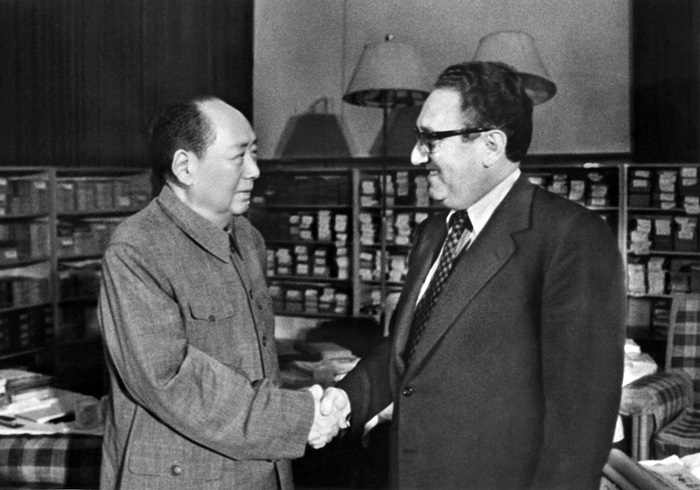
By Aavin Abeydeera
Having passed away at the age of 100, Kissinger’s death was mourned by many, and celebrated by an equally loud number in the international community. Hailed as a hero, and feared as a Machiavellian villain, Kissinger’s legacy is a result of his checkered actions and past, mirroring the State he served so loyally.
Central to Kissinger’s diplomatic philosophy was realpolitik, a pragmatic approach to international relations that prioritizes strategic objectives over ideological considerations.
Serving as both National Security Advisor and Secretary of State under Presidents Nixon and Ford, Kissinger orchestrated a recalibration of US foreign policy, placing an emphasis on power dynamics and national interest. This approach, transcending borders, significantly influenced global geopolitics, including the intricate landscape of the Asia-Pacific.
Realpolitik, while serving the purpose of doing away with ideological hubris, undid the United States’ commitment to upholding democracy, and acted as a harbinger of the state’s increasingly aggressive intervention-based foreign policy in the decades to come.
In fact, one could argue that it was Kissinger who laid the groundwork for the United States to embrace a role as “global policeman”, one that served its interests first, and not to its ideological vision.
Kissinger’s legacy is fraught with controversy, notably his associations with authoritarian regimes. Critics contend that in the pursuit of stability and anti-communist alliances, ethical considerations were compromised.
The allegations of involvement in Operation Condor, a campaign against political dissidents in Latin America, underscore the ethical dilemmas in Kissinger’s approach to foreign policy. If the US was born with the spirit of spreading democracy, Kissinger warped it to spreading security and order as America liked it, even at the cost of democracy.
In 1971, Kissinger’s secret mission to Beijing heralded a groundbreaking shift in global affairs: the normalization of relations between the United States and China. This diplomatic maneuver, driven by strategic considerations and the desire for a counterbalance to the Soviet Union, reverberated profoundly in the Asia-Pacific.
The aftermath was threefold. The ensuing Sino-Soviet split ensured that the Soviet Union lost a certain credibility as the steward of the global communist cause, ensuring that the United States’ global position was strengthened.
Kissinger’s role in legitimizing mainland China’s government ensured that the PRC would join the international community, give its people legitimacy on the global stage, and that one of the largest nations on Earth would join the UN Security Council, giving the PRC unprecedented power and legitimacy as a nation in the Asia-Pacific.
Thirdly and most importantly was the ensuing rise of China as a global power is a result of Kissinger’s deft geopolitical calculations.
In retrospect, Kissinger’s machinations to delegitimize the Soviet Union through giving power to China would lead to China becoming a rising world superpower, rivalling even its one-time ally the US. If one must explain China’s present role in the Asia-Pacific, one must ponder whether Kissinger saw the long-term ramifications of his moves.
While the above is certainly important, it was Kissinger’s involvement in the Vietnam War that is most obviously taken as an example of his global legacy, and more specifically, his legacy in the Asia-Pacific. His involvement in the war was marked by attempts to break peace, culminating in the Paris Peace Accords of 1973.
The complexities of these negotiations and the subsequent fall of Saigon in 1975, however, underscore the challenges inherent in Kissinger’s pursuit of diplomatic solutions in Southeast Asia. Additionally, the covert bombing campaign in Cambodia, aimed at disrupting North Vietnamese supply lines, remains a contentious aspect of his legacy.
Critics assert that the pursuit of strategic goals may have, at times, overshadowed the humanitarian implications of such military actions. The question is, if Kissinger’s aggressive policies did nothing to ensure stability in the region, was his use of the terrifying power at the US’s disposal justified at all?
A nuanced examination of Kissinger’s legacy in the Asia-Pacific reveals a strategic recalibration with far-reaching consequences. The normalization of relations with China, while contributing to the geopolitical dynamics of the Cold War, prompts scrutiny regarding its long-term implications. The subsequent ascendancy of China as a global power invites reflection on the enduring influence of Kissinger’s diplomatic initiatives.
Henry Kissinger’s legacy is complex, weaving together diplomatic achievements and moral quandaries. In Asia and beyond, his maneuvers continue to shape global dynamics. As policymakers grapple with the consequences of his policies, the tension between geopolitical imperatives and ethical considerations remains a central theme.
Aavin Abeydeera studied at the Bandaranaike Center for International Studies (BCIS). He is interested in learning and writing about the world and how it operates. His interests range from geopolitics, economics, and foreign policy to culture and sports.
Factum is an Asia-Pacific-focused think tank on International Relations, Tech Cooperation, and Strategic Communications accessible via www.factum.lk.
The views expressed here are the author’s own and do not necessarily reflect the organization’s.
